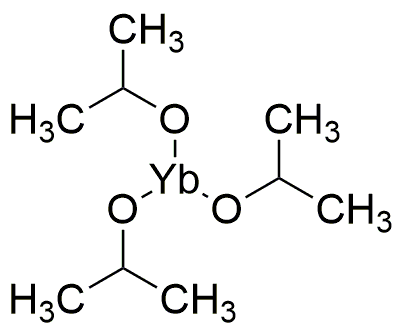Ytterbium(III) Isopropoxide is widely utilized in research focused on:
- Materials Science: This compound is used in the synthesis of advanced materials, particularly in the creation of luminescent materials and phosphors, which are essential for display technologies and lighting applications.
- Catalysis: It serves as a catalyst in organic reactions, enhancing reaction rates and selectivity. This is particularly valuable in the pharmaceutical industry for the synthesis of complex organic molecules.
- Nanotechnology: Ytterbium(III) Isopropoxide is employed in the fabrication of nanostructures, which can be used in various applications, including drug delivery systems and biosensors.
- Optoelectronics: The compound is integral in the development of optical devices, leveraging its unique luminescent properties to improve the efficiency of lasers and optical amplifiers.
- Research in Solid-State Chemistry: It is used to study the properties of solid-state compounds, aiding in the development of new materials with tailored electronic and magnetic properties for various technological applications.
General Information
Properties
Safety and Regulations
Applications
Ytterbium(III) Isopropoxide is widely utilized in research focused on:
- Materials Science: This compound is used in the synthesis of advanced materials, particularly in the creation of luminescent materials and phosphors, which are essential for display technologies and lighting applications.
- Catalysis: It serves as a catalyst in organic reactions, enhancing reaction rates and selectivity. This is particularly valuable in the pharmaceutical industry for the synthesis of complex organic molecules.
- Nanotechnology: Ytterbium(III) Isopropoxide is employed in the fabrication of nanostructures, which can be used in various applications, including drug delivery systems and biosensors.
- Optoelectronics: The compound is integral in the development of optical devices, leveraging its unique luminescent properties to improve the efficiency of lasers and optical amplifiers.
- Research in Solid-State Chemistry: It is used to study the properties of solid-state compounds, aiding in the development of new materials with tailored electronic and magnetic properties for various technological applications.
Documents
Safety Data Sheets (SDS)
The SDS provides comprehensive safety information on handling, storage, and disposal of the product.
Product Specification (PS)
The PS provides a comprehensive breakdown of the product’s properties, including chemical composition, physical state, purity, and storage requirements. It also details acceptable quality ranges and the product's intended applications.
Certificates of Analysis (COA)
Search for Certificates of Analysis (COA) by entering the products Lot Number. Lot and Batch Numbers can be found on a product’s label following the words ‘Lot’ or ‘Batch’.
*Catalog Number
*Lot Number
Certificates Of Origin (COO)
This COO confirms the country where the product was manufactured, and also details the materials and components used in it and whether it is derived from natural, synthetic, or other specific sources. This certificate may be required for customs, trade, and regulatory compliance.
*Catalog Number
*Lot Number
Safety Data Sheets (SDS)
The SDS provides comprehensive safety information on handling, storage, and disposal of the product.
DownloadProduct Specification (PS)
The PS provides a comprehensive breakdown of the product’s properties, including chemical composition, physical state, purity, and storage requirements. It also details acceptable quality ranges and the product's intended applications.
DownloadCertificates of Analysis (COA)
Search for Certificates of Analysis (COA) by entering the products Lot Number. Lot and Batch Numbers can be found on a product’s label following the words ‘Lot’ or ‘Batch’.
*Catalog Number
*Lot Number
Certificates Of Origin (COO)
This COO confirms the country where the product was manufactured, and also details the materials and components used in it and whether it is derived from natural, synthetic, or other specific sources. This certificate may be required for customs, trade, and regulatory compliance.


